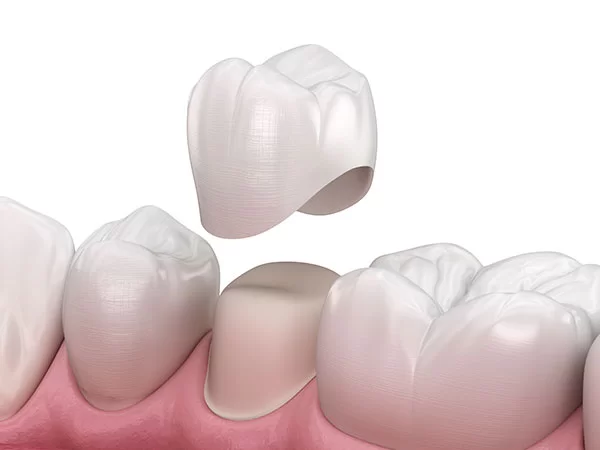Know When to Seek a Dental Crown
Dental crowns are essential for restoring damaged teeth, improving smile aesthetics, and protecting long-term dental health. If you’re experiencing specific dental issues or noticing changes in your teeth, it’s crucial to understand when a dental crown might be necessary.
Let’s explore the key signs to help you decide when it might be time to reach out to Dr. Frank Kuzmin, a trusted dentist in Farmington, CT. For personalized guidance, call our Farmington office at (860) 470-3660.
Do You Need a Dental Crown? Key Indicators to Watch
Advanced Tooth Decay or Deep Cavities
When tooth decay or cavities progress to an advanced stage, a dental crown may be necessary to restore the tooth’s structure and prevent further damage.
- Pain or Tooth Sensitivity: Persistent sensitivity to hot or cold could signal a cavity has reached the tooth nerve. A crown may help relieve discomfort and prevent further damage.
- Visible Signs of Decay: Dark spots, holes, or pits are signs of decay progression. Crowns restore structure and protect against additional deterioration.
Cracked or Fractured Teeth
Accidents or trauma can lead to cracked or fractured teeth, compromising their strength and function.
- Pain When Chewing: Discomfort during chewing can result from a crack that a crown can stabilize.
- Temperature Sensitivity: Fleeting pain when consuming hot or cold foods may indicate a crack. A crown helps insulate and stabilize the tooth.
- Visible Cracks or Fractures: Whether surface cracks or extensive fractures, crowns cover and support damaged teeth, preventing further cracks.
- Irritation from Rough Edges: Cracks with jagged edges can cause discomfort. A crown smooths the surface, eliminating irritation.
Large Fillings
If you have a tooth with a large filling, it may become weak over time.
- Failing Fillings: Large fillings can wear or loosen, compromising tooth strength. A crown offers stability and restores functionality.
- Increased Sensitivity: When fillings no longer protect teeth adequately, crowns can provide extra insulation and prevent sensitivity.
Post-Root Canal Treatment
Root canals can leave teeth susceptible to future issues, and crowns offer essential reinforcement, protecting the longevity of the treated tooth.
Misshapen or Severely Discolored Teeth
Crowns improve the look and alignment of misshapen or discolored teeth, enhancing the overall appearance of your smile.
Supporting a Dental Bridge
Crowns on adjacent teeth provide a strong foundation for dental bridges, helping secure and stabilize the bridge for effective tooth replacement.
Cracked Enamel
The outer layer of your teeth, known as enamel, is crucial for protecting the inner structures. If your enamel is cracked or significantly worn down, a dental crown can shield the affected tooth from further damage.
- Visible Cracks or Lines: Enamel cracks need protection to prevent further damage. A crown shields these vulnerable areas.
- Rough Edges and Staining: Cracks can expose rough edges or trap stains. Crowns provide a smoother appearance and protect against staining.
Wear from Tooth Grinding (Bruxism)
Persistent tooth grinding, also known as bruxism, can lead to excessive wear and tear on your teeth. Dental crowns can help restore the shape and structure of your teeth, preventing further damage caused by grinding.
- Flattened Surfaces: Grinding causes visible wear, and crowns restore the natural shape and protect teeth from further erosion.
- Jaw Pain and Headaches: Grinding may cause jaw discomfort or frequent headaches. Crowns, combined with other treatments, can alleviate these issues by enhancing bite stability.
Dental Implant Restoration
When replacing a missing tooth with a dental implant, a dental crown is typically used to cover the implant post. This crown acts as a natural-looking replacement tooth that blends seamlessly with your smile.
Aesthetic Concerns
If you are unhappy with the appearance of your teeth due to gaps, misalignment, or other cosmetic issues, dental crowns can help you achieve the smile you desire. They can improve the shape, size, and color of your teeth for a more aesthetically pleasing result.
Choosing the Right Dental Crown
Knowing the different types of crowns can help you make the best decision. Dr. Kuzmin can assist in selecting the most suitable option:
- Porcelain Crowns: Perfect for visible teeth due to their natural look.
- Zirconia Crowns: Durable and biocompatible, with excellent chip resistance.
- Metal Crowns: Great for molars; resistant to wear, though metallic in appearance.
- Porcelain-fused-to-metal (PFM) Crowns: Combining durability with a natural look, these crowns work well for front and back teeth.
Factors to Consider
When considering a dental crown, there are several important factors to keep in mind. These factors can help you make an informed decision and ensure the best possible outcome for your dental health.
- Longevity: Proper care can ensure crowns last for years.
- Cost: Prices vary by material and procedure complexity; Dr. Kuzmin can provide details on payment options.
- Aesthetic Impact: Crowns for front teeth often prioritize aesthetics, with porcelain or ceramic being popular choices.
- Preparation Needed: Some teeth may require minimal reshaping, while others need more extensive preparation.
Frequently Asked Questions
The choice of the best dental crown depends on various factors, including the specific dental condition, location of the tooth, aesthetic preferences, and budget. Porcelain crowns are often favored for their natural appearance, while metal crowns provide excellent durability. Porcelain-fused-to-metal (PFM) crowns offer a balance between strength and aesthetics. Your dentist will evaluate your needs and recommend the most suitable crown type.
Without a crown, a tooth that requires one may be at higher risk of damage or decay. The longevity of a tooth without a crown depends on factors such as the extent of damage, oral hygiene practices, diet, and habits like teeth grinding.
If a tooth requires a dental crown but you choose not to get one, several complications may arise. The tooth’s structural integrity may be compromised, leading to further damage, such as cracks, fractures, or decay.
This can result in pain, sensitivity, and even tooth loss. It’s best to follow your dentist’s advice and get a dental crown when necessary to preserve the tooth’s health and function.
Yes, alternative dental treatments are available depending on the specific dental condition. For minor aesthetic concerns, veneers or bonding might be options, though they may not offer the strength of crowns.
Start Your Journey to a Healthier Smile in Farmington, CT
Recognizing the signs that indicate a dental crown can help maintain your dental health and prevent further complications. Contact Dr. Kuzmin to learn how crowns can benefit you and improve your smile. We proudly serve Farmington, Plainville, New Britain, Hartford, and the surrounding Connecticut area.

